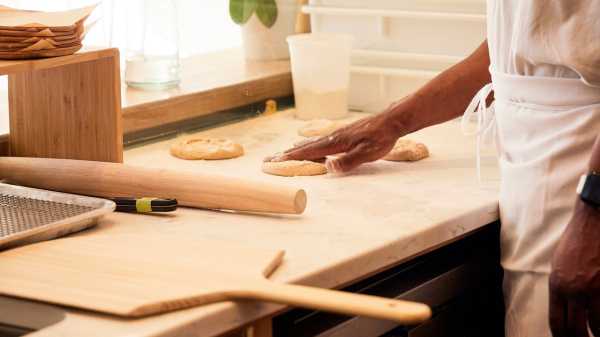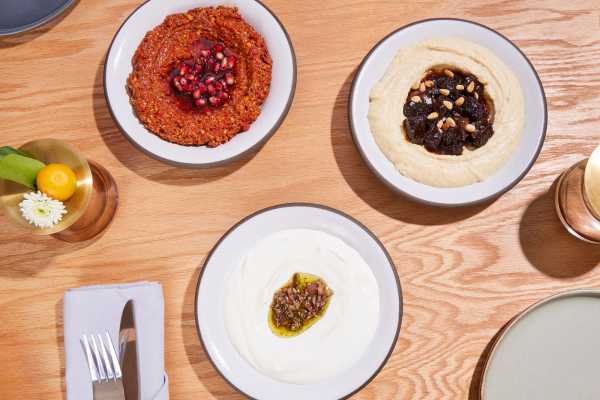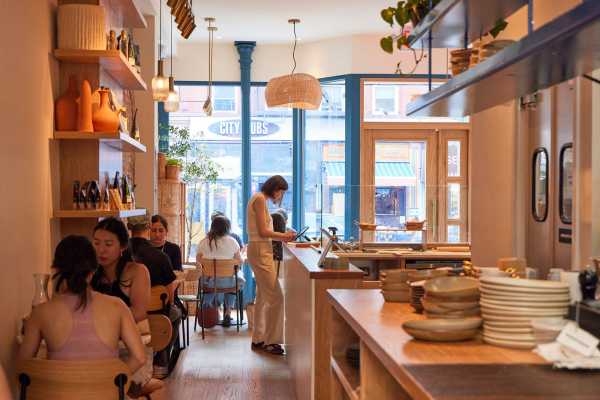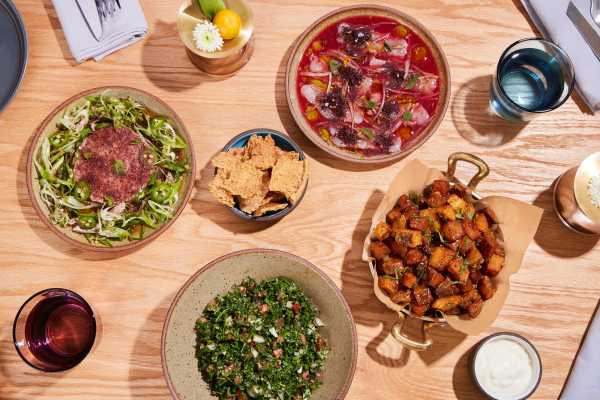
Save this storySave this storySave this storySave this storyYou’re reading the Food Scene newsletter, Helen Rosner’s guide to what, where, and how to eat. Sign up to receive it in your in-box.
The first thing you see when you walk in the door at Sawa, a new Lebanese restaurant in Park Slope, is not a host stand or a little vestibule to hover in while you wait for your table. Instead, you are greeted with a pane of glass, behind which a cook stands at a flour-dusted countertop pulling and portioning glossy blobs of blond dough. Every few moments, the pieces of dough are transferred to a great round bread oven hulking just beyond. It’s tiled in jade and white, and circular, with a chimney at the center of its domed ceiling—the best sort of oven for firing rounds of pita, drawing heat up and around in a blistering vortex. When a ball of dough hits the oven, it begins to inflate nearly instantly, its stretchy, well-proofed exterior holding in all the newly formed steam, which poofs and puffs into the bread’s famous internal pocket. Release comes only once it’s hit your table: tear open the pale balloon of bread, and steam puffs out in a white cloud of yeasty exhalation.

Dips include labneh with olives and za’atar, sweet and smoky muhammara, and hummus topped with a dollop of braised beef cheeks.
Most meals at Sawa begin with the bread, a sizable round of which comes with any of the restaurant’s selection of Middle Eastern dips: a bright swirl of labneh, thick and tangy and strewn with olives and za’atar; a magenta whorl of muhammara, sweet and smoky with charred red peppers and walnuts; a dense, garlicky hummus, which you can get topped with a dizzyingly savory dollop of braised beef cheeks, the meat as velvet-soft as the hummus itself. Sawa, which opened in April, is owned by a pair of Lebanese siblings: Samaya Boueri Ziade, a longtime Park Slope resident and self-taught culinarian who used to run an occasional Levantine pop-up, and George Boueri, an architect. Ziade developed Sawa’s recipes; the chef Soroosh Golbabae, formerly of the exceptional Persian restaurants Sofreh and Eyval, runs the kitchen. The restaurant, which fills two connected storefronts, has a streamlined, easy flow: past the bread station is a friendly open kitchen; a right turn takes you through a large doorway to the airy dining room. (A spacious back yard, not yet open, will more than double the restaurant’s capacity.)

The restaurant’s casually refined style—bare wood tables, minimalist glassware—belies the carefully composed cooking.
There are many perfectly fine Lebanese restaurants feeding this part of Brooklyn, though until now a hungry person headed this way in search of something truly excellent would have had better luck staying on the R train until it reached Bay Ridge, where a meal at the wonderful Le Sajj is incomplete without a plate of the kitchen’s beautiful kibbeh nayyeh, a dish of raw minced lamb and bulgur wheat. Sawa, thrillingly, brings a destination-worthy degree of precision and clarity to its cooking—and to kibbeh nayyeh, as well, which is served with crisp pita crackers, for scooping. It’s unctuous and rich, fragrant with green onion and mint, the subtle gaminess of the meat made lemon-bright with sumac. Batata hara—cubes of crisp-fried potatoes—come with a sidecar of toum, fiery raw garlic whipped with oil and salt until it takes on the snowy appearance of marshmallow fluff. Nearly as potent, albeit in a greener, less face-melting sense, is the tabbouleh: my first bite of the finely minced parsley salad, tart and sharp with lemon juice and onion, was as bracing as a smack. The samke nayyeh—ribbons of cured fluke in a vermillion pool of blood-orange juice with marjoram and sumac—looks like it ought to be just as forceful but tastes smooth and clean, a subtle, slightly sweet showcase for the delicate flavor of the fish.
Helen, Help Me!
E-mail your questions about dining, eating, and anything food-related, and Helen may respond in a future newsletter.
“Sawa” is the Arabic word for “together,” and Ziade has said that she chose the restaurant’s name to evoke memories of Beirut, and vibrant, lingering meals shared there with loved ones. Speaking to that philosophy, entrées at Sawa are sized for sharing; dining with one other person, I felt a little sad that the physical limits of both the table and our bodies meant that we couldn’t sample more. Despite the refined casualness of the room—bare wood tables, a conversational sort of service style, minimalist glassware in which the cocktails (classic, nicely mixed) are served—the food has a grandness to it, a composed, thoughtful formality that makes a meal at Sawa feel like something of a special occasion. Some of this is the inherent splendor of the cuisine of the Levant, with its array of meats and seafoods and dazzling rainbow of herbs and fruits. But there’s a specificity to Ziade and Golbabae’s food, a practical display of elegance and exactitude, that makes their interpretations of traditional fare feel assertive and fresh.

Clockwise from left: kibbeh nayyeh (raw minced lamb and bulgur wheat); cured fluke in blood-orange juice; crisp-fried potatoes; and tabbouleh salad.
The kibbeh arnabiyeh—a seasonal dish that will leave the menu as the weather warms—is a true showpiece, involving torpedoes of fried kibbeh and soft pearl onions arranged geometrically in a puddle of tahini sauce around a tender lamb shank, its bone rising up like a spire. It’s strewn with pine nuts, tiny mint leaves, and sticky, sweet-tart wheels of candied kumquat, circles of marigold yellow so intense that they almost seem to glow. Dorade is grilled whole and presented atop stewed tomato and peppers, with a garden-green herb sauce swizzled across the top. The fish arrives already deboned, an unexpected and strikingly polished touch. I felt a deep sense of contentment at the end of each meal I had at Sawa, lingering over a piece of semolina cake perfumed with orange blossoms, or spooning up the dregs of a bowl of layali lubnan (a slumpy semolina milk pudding sweetened with banana and dusted with pistachios and dried rose petals). I watched puffs of steam rise up from other tables as guests tore into their pita rounds, their own lovely dinners just about to begin. ♦
Sourse: newyorker.com
